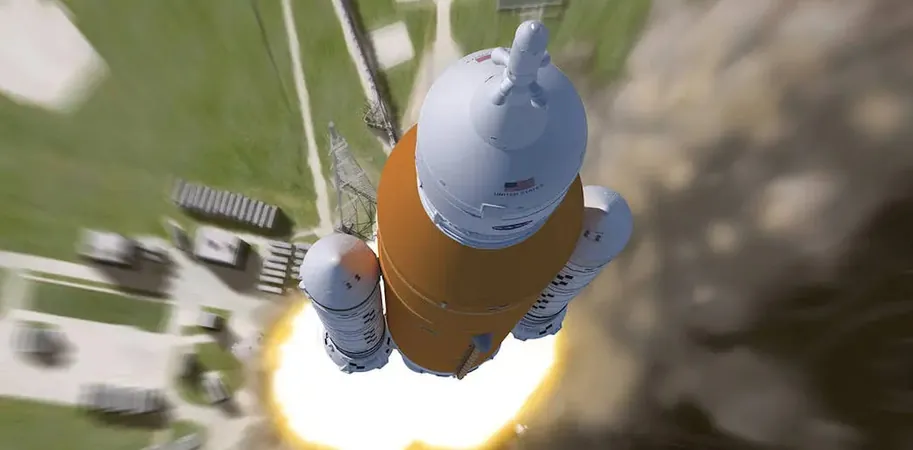
Is Trump Set to Cancel NASA’s SLS Moon Rocket? Here’s What It Means for SpaceX and the Future of Lunar Exploration!
2024-12-02
Author: Ying
Introduction
Former President Donald Trump's recent electoral victory has sparked rampant speculation about the future of NASA's powerhouse vehicle, the Space Launch System (SLS). As the backbone of the Artemis program — which aims to return humans to the Moon for the first time since 1972 — the SLS plays a crucial role in America's renewed lunar ambitions.
The Role of SLS in Artemis III
Scheduled for the pivotal Artemis III mission, the SLS is poised to launch four astronauts aboard NASA's Orion crew capsule. The journey will whisk them toward the Moon, where the Orion will rendezvous with SpaceX’s Starship. From there, two astronauts will transfer to the Starship for their descent to the lunar surface. After completing their historic lunar outing, the astronauts will dock back with Orion and return home, leaving the Starship in lunar orbit.
Uncertainty Surrounding SLS
However, the future of the SLS has become increasingly uncertain. Space journalist Eric Berger recently suggested, "We are far from anything being settled, but based on what I’m hearing, it seems at least 50-50 that NASA’s Space Launch System rocket will be cancelled." This unsettling news has raised eyebrows among space enthusiasts, particularly as no official announcements have yet been made.
Potential Shift in Space Policy
The potential cancellation of the SLS could align with trends observed during Trump's first administration, which hinted at a move to scale back NASA's operations and pivot toward private contractors. Such a shift could significantly alter America's approach to space exploration at a time when nations like China are making aggressive strides of their own, targeting lunar landings by 2030.
Intensifying Competition
The fight in this new space race intensifies with delays on both the Artemis schedule and the Starship project. While Musk’s SpaceX has been lauded for successful tests, the Starship is still undergoing critical milestones, including in-space refueling and uncrewed lunar landings. Experts warn that if China reaches the Moon before the U.S., it could set back American space aspirations considerably.
Musk's Influence on Space Policy
In light of his close ties to Trump, Elon Musk has been positioned as a key figure in streamlining administrative costs, potentially slashing as much as $2 trillion from the federal budget. Notably, Musk's vision for a manned Mars mission by 2028 raises questions about priorities shifting away from lunar exploration.
Challenges Faced by Artemis Program
The Artemis program, originally established by the Trump administration in 2017, is flawed and facing delays. NASA initially aimed to have astronauts on the Moon by now, but has since adjusted its timeline to 2026 for Artemis III due to a myriad of technical challenges, from spacesuit redesigns to delays with the Orion spacecraft's systems.
SLS vs. SpaceX's Starship
Interestingly, the SLS has performed exemplary during earlier tests, showcasing its reliability. Yet, critics are quick to point out its exorbitant costs, with each launch estimated at over $2 billion. SpaceX’s Starship, on the other hand, is targeted to be fully reusable, potentially revolutionizing the economics of space travel.
The Future of Lunar Exploration
Should the SLS be retired, many wonder if Starship could step in as both launch vehicle and lunar lander. While technically plausible, this would require overcoming significant logistical hurdles, as Starship is still in the developmental stage while the SLS is fully operational. Alternatives like Falcon Heavy could theoretically launch Orion, but would necessitate extensive modifications, raising the specter of further delays.
Conclusion
Time is not on NASA’s side. As the competition heats up, particularly with lunar exploration targets like the scientifically rich south pole, innovative solutions and commercial partnerships may be crucial. With vast investments already poured into the SLS, its outright cancellation may not be the most economically sound decision.
As the Trump administration weighs its priorities in space policy, it faces a challenging balancing act. The potential implications of canceling or revamping NASA's Moon missions will resonate well beyond the immediate future, affecting not only the agency’s storied legacy but also America's position in the new age of space exploration. The stakes couldn’t be higher as the race to the Moon and beyond reaches new heights. Will the U.S. secure its spot as a leader in space, or will it fall behind in the race for the cosmos? The answer could depend on the choices made in the coming months.





 Brasil (PT)
Brasil (PT)
 Canada (EN)
Canada (EN)
 Chile (ES)
Chile (ES)
 España (ES)
España (ES)
 France (FR)
France (FR)
 Hong Kong (EN)
Hong Kong (EN)
 Italia (IT)
Italia (IT)
 日本 (JA)
日本 (JA)
 Magyarország (HU)
Magyarország (HU)
 Norge (NO)
Norge (NO)
 Polska (PL)
Polska (PL)
 Schweiz (DE)
Schweiz (DE)
 Singapore (EN)
Singapore (EN)
 Sverige (SV)
Sverige (SV)
 Suomi (FI)
Suomi (FI)
 Türkiye (TR)
Türkiye (TR)